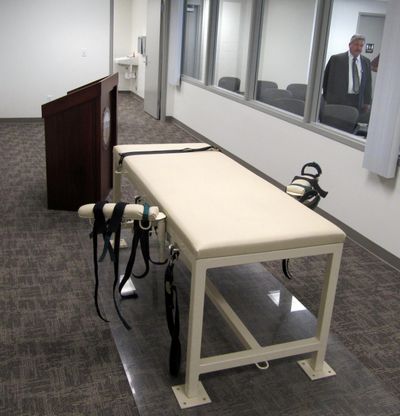Idaho judge: Lethal injection drug source is secret for now

BOISE – An Idaho judge has modified a previous decision, and now says state prison officials can hold off on identifying where they obtain the drugs used in executions until a trial is held on the matter.
Fourth District Judge Lynn Norton ruled in May that the state had to turn over nearly all of its execution records, including those identifying the source of the execution drugs, to a University of Idaho professor who sued for access to the documents under the Idaho Public Records Act.
But on Monday, Norton modified her decision, saying the state could redact any information that would identify the source of the lethal drugs for now. A trial will be held in the future to decide whether those redactions are allowable under the public records law.
State prison officials have argued that releasing the name of the drug supplier would subject that entity to such intense public pressure that the state would be unable to obtain the drugs in the future.
The way states find, obtain, pay for and store lethal injection drugs has been a key issue in court cases across the country.
Many state prison officials try to keep such records secret, in part over fears that suppliers will dry up.
Drug companies Alvogen, Hikma Pharmaceuticals USA and Sandoz Inc. have accused Nevada officials in a lawsuit of improperly obtaining their drugs for a use the companies don’t allow – lethal injection – and deceiving the public in the process. Nevada officials had tried to keep the drug companies identities’ secret, but a court order in an American Civil Liberties Union lawsuit in July forced the state to reveal the company names.
Fifteen states, including Idaho, have sided with Nevada in the state court fight against the drug companies.
Pharmaceutical company Pfizer announced in 2016 that it would not provide lethal injection drugs to states, and last year the company asked states to return any previously obtained lethal injection drugs.
With most traditional suppliers gone, some states have turned to compounding pharmacies or foreign countries to purchase the drugs.
University of Idaho Professor Aliza Cover filed a public records request with the Idaho Department of Correction last year seeking purchase orders, receipts, source paperwork and other documents on the drugs the state used in its two most recent executions, along with any documents on the drugs it expects to use in future executions. But the department refused, contending the information was exempt under the public records law.
The state has only executed three people in the last 25 years: Keith Wells in 1994, Paul Ezra Rhodes in 2011 and Richard Leavitt in 2012. Currently nine inmates are awaiting execution.
Idaho Department of Correction spokesman Jeff Ray said the department does not have a comment at this time.
Cover’s attorney, Ritchie Eppink with the American Civil Liberties Union of Idaho, says the new ruling was for technical procedural reasons.
“Secrecy around lethal injection gravely harms democracy and the public interest,” Eppink wrote in an email. “We intend to show that, once again, during the upcoming trial.”
The trial date has not yet been set.